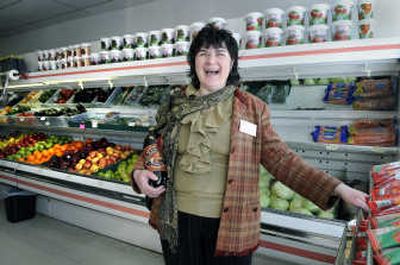Connect: Immigrant relishes taste of freedom

Tatyana Bistrevsky grew up as a Christian in a country that made an official point of denying God’s existence.
She’d go to school in her native USSR and present her homework assignment at the board in front of the class. All the T’s would be crossed and I’s dotted, she said, and the teacher would look at her and say: “Good, you did everything correctly. Now tell me what you did last night? Did you pray again last night? You prayed again last night – so you get a C. Now go sit down.”
Today, it’s difficult to imagine Bistrevsky, 43, as a crushed little girl. A tall, formidable woman with pitch-black hair and sparkling dark eyes, she’s an optimistic whirlwind, laughing, talking and most of all, working.
“I see a need and I try to help,” said Bistrevsky, who works at the Washington State University-Spokane County extension office in the nutrition education and 4-H programs. “That’s just who I am. I try to help the youth, especially, to become more integrated in our community.”
Bistrevsky knows about children, being the mother of five, the youngest of whom was born in the United States.
It was in 1989 when Bistrevsky, after years of persecution, left the USSR with her husband and their four children. They had to give up their citizenship and pay a fine.
The family left for Czechoslovakia and then Austria, where they contacted the American Embassy and applied for refugee status. They moved on to Italy, where they lived for a couple of months until they got refugee status.
“That was the time where you needed a sponsor to move here and our sponsor was in Tacoma, so that’s where we went,” Bistrevsky said.
She knew just a few words of English. The family had little money, and it took a year of saving before they could buy a car.
After five years in Tacoma, they headed to Spokane, where Bistrevsky became an American citizen 10 years ago.
“I was so proud that day I became a citizen. I love the United States,” she said. “I did this for my kids, to give them better opportunity. I did this to get away from persecution.”
As Christians living in a communist country, Bistrevsky’s family was discriminated against and often humiliated. The state took custody of her brothers and sisters and raised them in orphanages to “protect” them from the influence of religion.
“They were brainwashed. … I was constantly told that there is no God and that I was a nobody,” Bistrevsky said. “The KGB was watching our house, every step.”
Her mother’s faith helped Bistrevsky survive. The older woman told her daughter she had to be a good Christian and a role model for other children.
“My mom said I was the salt of the earth, but I wanted to cry,” Bistrevsky said. “I wanted to be the sugar! Why can’t I be the sugar?”
Today, her energy and dedication to helping Slavic immigrants integrate into Spokane has made her that sugar to many people.
She often serves as a translator, holds cooking classes, helps high school students fill out college applications and assists Russians who speak limited English access health clinics and other services.
“No matter what you ask of her, she always manages to do it,” said Jean Farmer, executive director of the Northeast Community Center in Spokane. “If you say, I just want you to meet this person or this grant writer or whatever it is, she is right there to help.”
Bistrevsky was the driving force behind a community garden project at the center that attracts elderly Russian and Ukrainian immigrants. “In Russia, it’s called ‘Dacha,’ ” Bistrevsky said. “We love that. To us, gardening is building community. If we have houses like here, and a backyard, we don’t have grass – we have a garden.” Elderly Russians embraced the project, and when Bistrevsky brought 4-H youths around to help out, friendships were formed and conversation flowed.
The effort culminated in a Slavic Harvest Festival last year.
“I look at it as a generational bridge,” Bistrevsky said. “Many of these kids, they are so torn apart. You ask why they are here and they say their parents brought them here. They don’t belong here or in Russia. This helps connect them to their past and hear their history from the elderly.”
Through her job as a program assistant at WSU’s county extension office, Bistrevsky has pulled together resources and put them to work for the integration of the Slavic community.
“It is always a multifaceted thing with her – she never does one thing at a time,” said Ed Adams, county director at WSU Extension. “She’ll say: If we can have gardening, let’s also figure out how people can get more exercise and how they can get better nutrition and how we can get the elderly and the youth involved together.”
One of Bistrevsky’s ideas was the Community Connections 4-H Club, which has a majority of Slavic youth participants. The club first met in Bistrevsky’s kitchen, but soon outgrew that space. Classes are taught in both English and Russian and focus on a variety of subjects, including social skills and etiquette, handling peer pressure, computers.
That club recently won the Washington State Community Pride Award, a first for a Spokane County 4-H Club.
“It makes me feel so proud of myself,” said Bistrevsky. “And of the youth, of course I’m proud of the youth. They do so well. Some are at SCC and some are at WSU – it makes me so happy I know they will be successful.”
She still has some family in Russia and she’s gone back twice. But there is no turning back.
“This is home to me, now, this is my country,” she said. “All this time, I knew God prepared a place for me – I just didn’t know where, until I got here.”